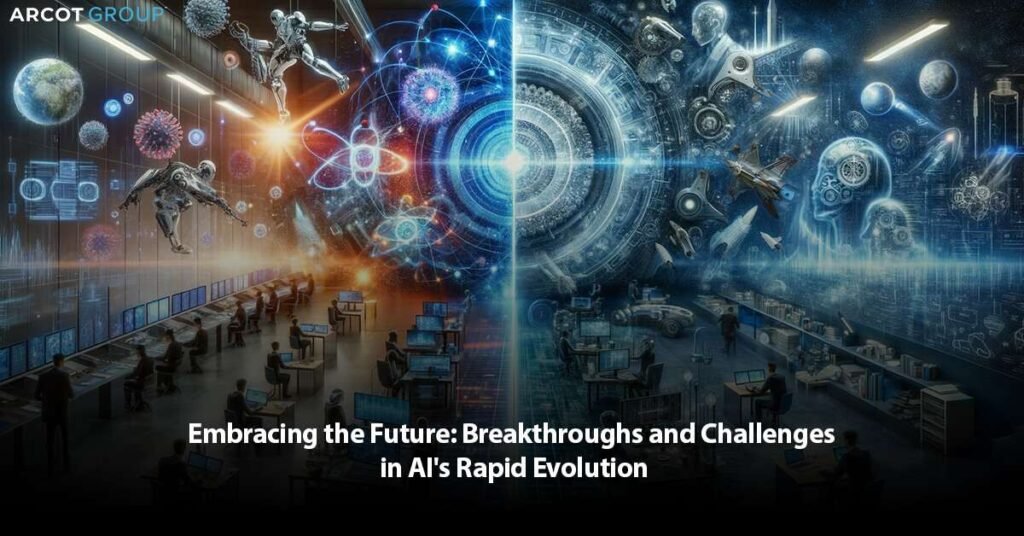In the rapidly evolving world of artificial intelligence (AI), each day brings new breakthroughs and challenges that redefine our understanding of technology’s potential. From groundbreaking discoveries at OpenAI to innovative strides at Microsoft and MIT, the landscape of AI is witnessing transformative changes that promise to reshape industries and daily life.

OpenAI’s Groundbreaking Discovery and Organizational Upheaval
Recently, OpenAI’s researchers made a startling discovery, unveiling a powerful AI algorithm named Q* (Q-Star). This algorithm is perceived as a significant step towards artificial general intelligence (AGI), an autonomous system surpassing human abilities in economically valuable tasks. Q*’s capabilities, particularly in solving mathematical problems, demonstrate a level of reasoning akin to human intelligence, a feat that has long eluded the AI community. However, this discovery came amid internal organizational upheaval, leading to the temporary ouster of CEO Sam Altman. This development raised crucial questions about the ethical and safety considerations of rapid AI advancements. source
Real-Time Case Study
A practical example of Q*’s potential can be seen in its application to complex problem-solving scenarios. For instance, in a simulated environment, Q* was tasked with optimizing logistical operations for a large-scale distribution company. The AI model efficiently identified routes and strategies that significantly outperformed existing systems, showcasing its practical utility in real-world applications.

Microsoft Ignite 2023: AI at the Forefront
At Microsoft Ignite 2023, AI’s role in transforming work and technology was a key focus. Microsoft unveiled several innovations, including the AI accelerator chip “Azure Maia” and the “Azure Cobalt” chip, optimized for performance and efficiency. These advances are pivotal in enhancing cloud-based AI workloads and applications such as Bing, GitHub Copilot, and ChatGPT. Furthermore, Microsoft expanded its Copilot offerings, integrating AI across various roles to streamline productivity and business processes. source
MIT’s Huge: Revolutionizing Robot Training
MIT researchers, in collaboration with Harvard and the University of Washington, introduced HuGE (Human-Guided Exploration), a novel reinforcement learning method. HuGE leverages crowdsourced feedback to efficiently teach AI agents complex tasks. This method shows great promise in both simulations and real-world scenarios, like training robotic arms to perform precise tasks, illustrating the practical applications of AI in robotics and automation.source
Another significant development comes from MIT’s StableRep system, which uses synthetic images from text-to-image models for machine learning. This system has surpassed traditional training methods that rely on real images. StableRep’s approach, while efficient, faces challenges such as potential biases and the need for initial real data training, highlighting the ongoing need to address ethical and quality concerns in ai development source
UK and Global Partners Launch World’s First AI Cybersecurity Guidelines
In a groundbreaking move, the UK, together with the US and 17 other countries, has unveiled the world’s first international guidelines for securing AI systems against cyber threats. Developed by the UK’s National Cyber Security Centre (NCSC) and the US’ Cybersecurity and Infrastructure Security Agency (CISA), these guidelines mark a significant step in ensuring the safe and secure development of ai technology.
The guidelines advocate a “secure by design” philosophy, urging developers and organizations to embed cybersecurity at every stage of AI development—from design through operation. They focus on four critical areas: secure design, development, deployment, and operation and maintenance, offering best practices for each phase
This initiative has garnered wide support, with endorsements from all G7 members and countries across Europe, Asia-Pacific, Africa, and the Americas. The launch event in London saw participation from over 100 industry, government, and international partners, including representatives from Microsoft, the Alan Turing Institute, and various cyber agencies. Source
Lindy Cameron, CEO of NCSC, emphasized the urgency of integrating security in AI’s rapid development, stating that security must be a core requirement, not an afterthought. Echoing her sentiment, US Secretary of Homeland Security Alejandro Mayorkas highlighted the pivotal role of cybersecurity in building reliable AI systems. Source

AntiFake: A Novel Tool to Combat AI-Generated Deepfake Audio
Washington University’s Ning Zhang, Assistant Professor at the McKelvey School of Engineering, has developed AntiFake, an innovative defense mechanism against unauthorized speech synthesis. Unveiled at the Association for Computing Machinery’s Conference in Copenhagen, AntiFake represents a proactive approach to deepfake audio threats.
Distinct from traditional methods that detect synthetic audio post-attack, AntiFake actively prevents the creation of deceptive speech. By employing adversarial techniques, it hinders AI tools from accurately reading voice characteristics from recordings. This approach slightly alters the audio signal, making it challenging for AI to interpret yet still perceptible to human ears.
Tested against five advanced speech synthesizers, AntiFake boasts a protection rate of over 95%, showing effectiveness even against commercial synthesizers. The tool, which is freely available, has also been validated for accessibility by diverse users.
Currently focused on safeguarding short speech clips, the most common target for voice impersonation, AntiFake has potential for broader applications, including longer recordings and music. Zhang, along with graduate student Zhiyuan Yu, envisions a future where voice recordings are fully protected, continuously adapting to the evolving AI landscape. Source

Conclusion:
The current state of AI is a testament to human ingenuity and technological prowess. While these advancements bring forth new possibilities and efficiencies, they also pose ethical, safety, and quality challenges that must be meticulously addressed. As AI continues to evolve at a breakneck pace, it’s crucial to balance innovation with responsibility, ensuring that the future of AI aligns with the broader goals of society and human well-being.
For more insights and daily updates on the ever-evolving world of AI, stay informed with Arcot Group, your reliable source for the latest in AI news and developments.
